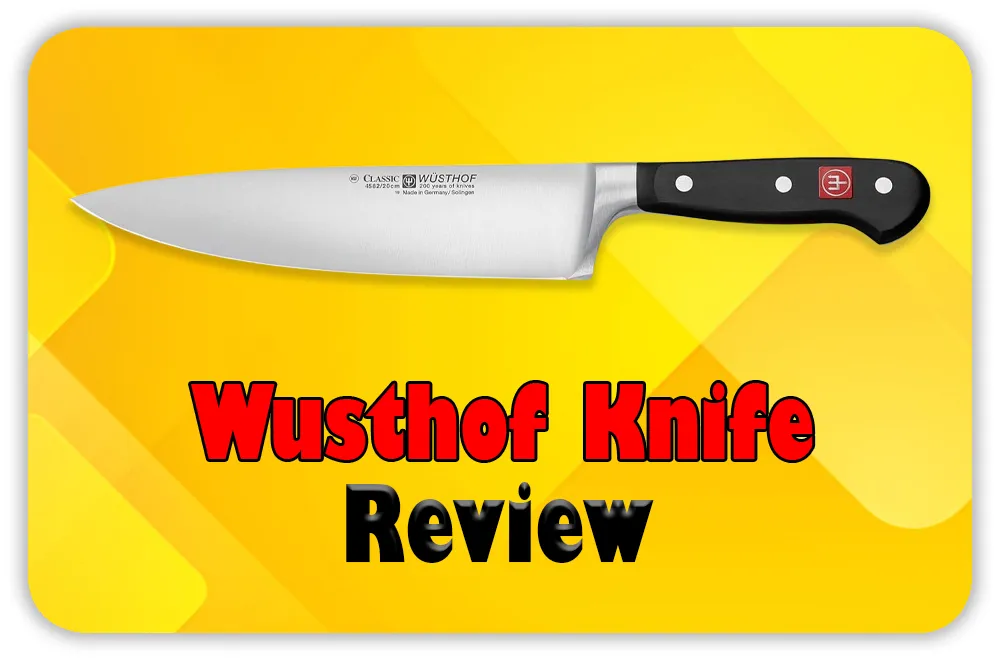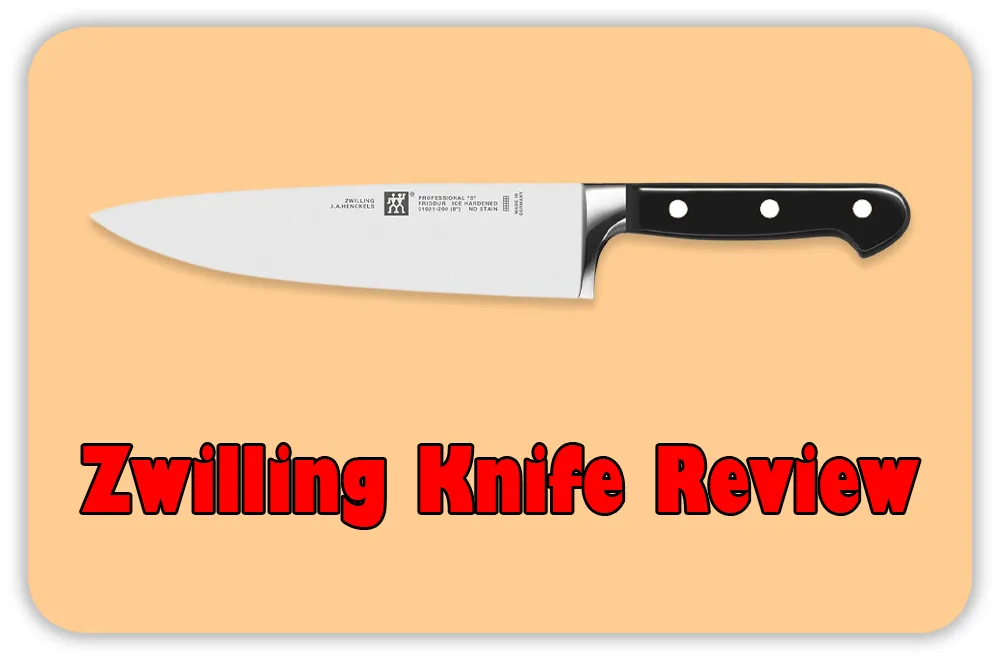When it comes to quality kitchen knives, Wüsthof and Zwilling are two names that always stand out. I’ve used both, and each has its strengths. But depending on what you value in a knife—sharpness, balance, or feel—one might suit your style better. Let’s dive into the details to help you find your best match.
Table of Contents
Wusthof Chef Knife Review: Precision and Power
The Wüsthof Chef’s Knife has been a staple in my kitchen. Right out of the box, it’s razor-sharp. I remember how smoothly it sliced through butternut squash, which is usually a tough task. It’s balanced and gives me confidence, whether I’m chopping herbs or slicing tomatoes.

Pros
- Super Sharp: Wüsthof’s high-carbon steel keeps an edge well. I rarely need to resharpen.
- Ergonomic Handle: The three-rivet handle feels sturdy and comfortable.
- Heavy and Durable: This knife can handle big jobs.
Cons
- Heavier Feel: If you’re new to chef’s knives, the weight might take a bit of getting used to.
- Synthetic Handle: It’s durable but lacks the elegance of natural wood.
Zwilling Chef Knife Review: Balanced and Reliable
The Zwilling Chef Knife is slightly lighter, making it feel agile in hand. Its ice-hardened blade retains sharpness after long sessions, ideal for everyday cutting. I noticed how easily it sliced through tomatoes without squishing them—no struggle at all.

Pros
- Edge Retention: The ice-hardened FRIODUR blade keeps its edge longer.
- Balanced Grip: Full tang and three-rivet handle make it comfortable to maneuver.
- Low Maintenance: Stain-resistant steel holds up well, even with heavy use.
Cons
- Cleaning Care: Though it’s dishwasher-safe, hand-washing preserves the edge.
- Minor Flaws: Some users report small imperfections, like slight marks.
Key Differences: Wusthof vs Zwilling
| Feature | Wüsthof | Zwilling |
| Blade Structure | Thicker, great for dense foods | Thinner, agile, suitable for finer cuts |
| Blade Material | High-carbon stainless steel | Ice-hardened high-carbon stainless steel |
| Handle Material | Synthetic handle with three rivets | Synthetic, full-tang handle |
| Blade Hardness | Harder steel, holds edge longer | Softer steel, easier to sharpen |
| Blade Sharpness | 14-degree edge, extra sharp | 15-degree edge, retains sharpness well |
| Weight | Heavier, sturdy feel | Slightly lighter, balanced feel |
| Edge Retention | Stays sharp with less frequent sharpening | Retains sharpness but needs occasional sharpening |
| Price | Typically more expensive | Generally more affordable |
Blade Structure: Wusthof vs Zwilling
Wusthof blades have a slightly thicker structure, which works well for dense or tough foods like squash or big cuts of meat. The Zwilling blade is a bit thinner, making it perfect for slicing delicate items like herbs or tomatoes. Personally, I like the Wusthof for heavy-duty tasks and Zwilling for more refined cutting.
👉🏻👉🏿 Check Latest Price and Offer at Amazon 👈🏿👈🏻
Blade Material: Which Lasts Longer?
Both knives use high-carbon stainless steel, but Zwilling’s unique ice-hardening process, called FRIODUR, adds durability. This helps it stay sharp longer and resist stains.
I’ve found Zwilling’s blade handles heavy use well without needing too much upkeep. Wusthof is equally strong, but I give Zwilling a slight edge for maintenance.
👉🏻👉🏿 Check Latest Price and Offer at Amazon 👈🏿👈🏻
Handle Material: Comfortable and Durable
Each knife has a synthetic handle with three rivets for added strength. Wusthof’s handle feels a bit more substantial, which helps during heavy chopping.
Zwilling’s handle, on the other hand, feels balanced and lighter, making it easier to use for extended periods. If you’re doing a lot of slicing, the Zwilling might feel more comfortable.
👉🏻👉🏿 Check Latest Price and Offer at Amazon 👈🏿👈🏻
Blade Hardness: Long-Lasting Sharpness
Wusthof uses harder steel, which holds its edge longer, so I don’t need to sharpen it as frequently. Zwilling’s softer steel is easier to hone, which can be a bonus if you like maintaining the edge yourself. Both options have their strengths, but Wusthof might need less frequent sharpening.
Blade Sharpness: Precision and Performance
Wusthof’s 14-degree edge is sharper out of the box, great for paper-thin cuts or fine chopping. Zwilling’s 15-degree edge also stays sharp but might need occasional honing. I find the Wusthof slightly sharper for precise tasks, while Zwilling shines in general daily cutting.
👉🏻👉🏿 Check Latest Price and Offer at Amazon 👈🏿👈🏻
Performance Summary
- Overall Winner: Zwilling (for versatile, balanced design).
- Best for Precision: Wüsthof (for sharper, precise cuts).
- Best for Durability: Zwilling (for long-lasting edge retention).
Read More: Shun vs Wüsthof
Wusthof vs Zwilling: Final Thoughts
Both Wüsthof and Zwilling are top-notch brands. If you want a slightly lighter knife that’s easy to control, Zwilling is a reliable choice. For precision tasks or if you prefer a solid, heavy knife, Wüsthof shines. In my kitchen, both find their moments, but Zwilling gets picked up a bit more for everyday slicing and dicing.
👉🏻👉🏿 Check Latest Price and Offer at Amazon 👈🏿👈🏻
FAQs: Wusthof vs Zwilling
Will Wusthof knives last a lifetime?
Yes, Wusthof knives can last a lifetime with proper care. They’re crafted from high-carbon stainless steel, designed for durability and long-term use.
Does Wusthof rust?
Wusthof knives are rust-resistant due to their high-carbon stainless steel. Hand washing and drying them immediately after use prevents rust.
What is the difference between Zwilling and Wusthof?
Wusthof knives are sharper and heavier, ideal for precision. Zwilling knives are lighter with slightly softer steel, making them easy to sharpen and maintain.
What are Zwilling knives made of?
Zwilling knives are made from high-carbon stainless steel. They use a unique ice-hardening process, FRIODUR, for added durability and rust resistance.
Do Zwilling knives rust?
Zwilling knives resist rust due to the FRIODUR ice-hardening. While dishwasher-safe, hand-washing helps keep them rust-free and sharp longer.
Are Wusthof knives good for beginners?
Yes, Wusthof knives are sharp and well-balanced, though they’re slightly heavier. Beginners may appreciate the control they provide for precision cuts.



